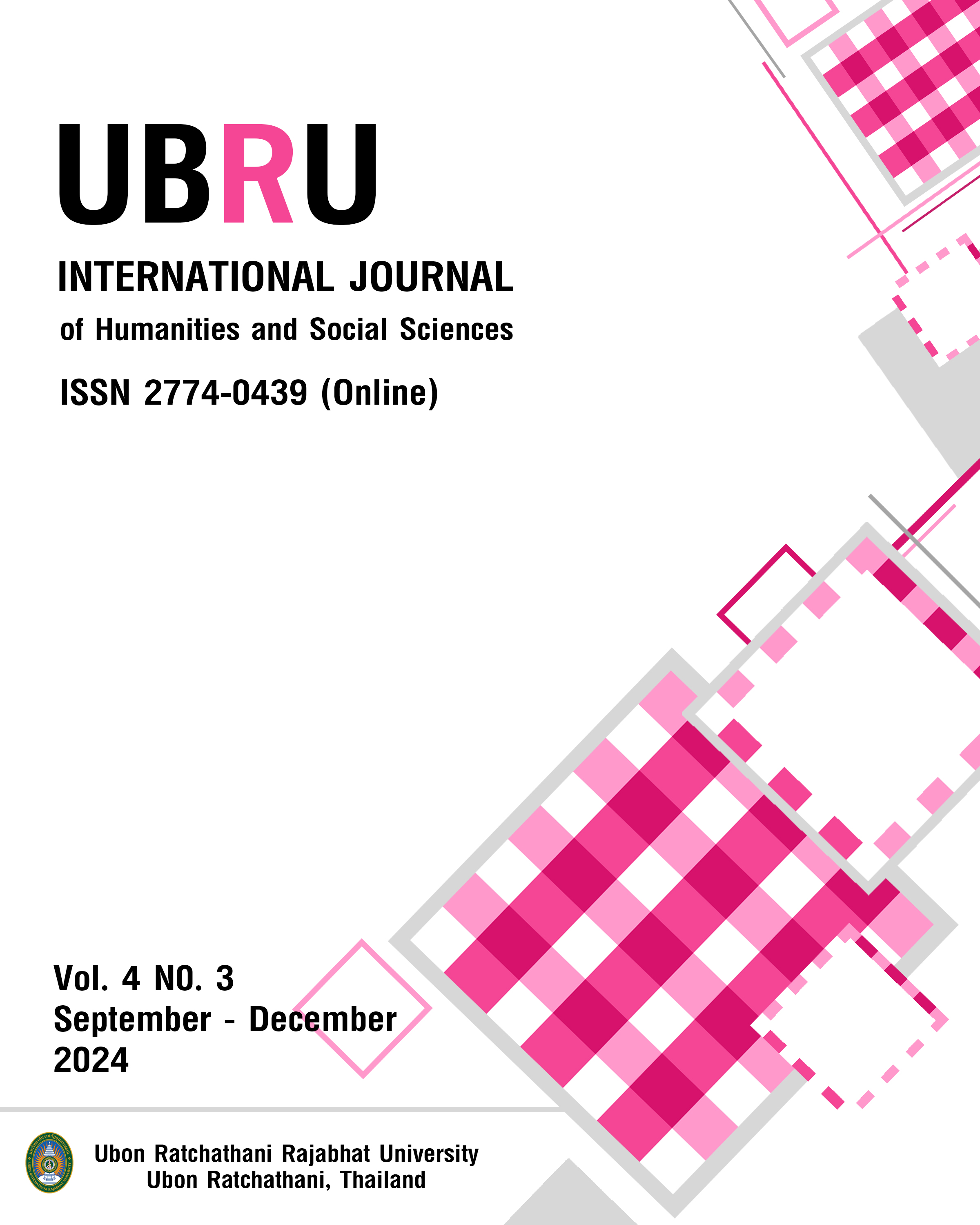The Development of An Ecological Intelligence System to Promote Being a Happiness University of Students, Personnel, and Communities
Main Article Content
Abstract
This research aims 1) to develop an ecological intelligence system to promote being a happiness university, and 2) to operate the pragmatic activity forum to implement an ecological intelligence system to promote being a happiness university. For quantitative research, 1,090 samples generated from Yamane’s formula (1973) by quota sampling include 390 students, 300 personnel, and 400 people in the communities of the service area of Ubon Ratchathani Rajabhat University (UBRU). For qualitative research, the samples selected by convenience sampling consist of 55 students, 33 personnel, and 11 people in the communities of UBRU service area.
The curriculum is evaluated before implementation, the results are found that; 1) the curriculum structure of an ecological intelligence system in terms of principles and reasons of the pragmatic activity forum is absolutely appropriate, 2) the pragmatic forum contents of an ecological intelligence system consist of 3 units: Unit 1, the growth mindset development indicates that the scope of the pragmatic forum contents is absolutely appropriate; Unit 2, the self-esteem development indicates that the learning activities and the pragmatic forum procedures are absolutely appropriate; Unit 3, the promotion of being a happiness university indicates that the learning media for the pragmatic forum is absolutely appropriate.
The pragmatic activity forum for 3 leader groups (a group per day) was held on 24-26 July 2024 at the Inthanin Building, Faculty of Business Administration and Management, UBRU. Trainees who took the pre-test and the post-test indicated that the pre-test and the post-test were different for all groups and the post-test score was higher than the pre-test score. In addition, it was shown that trainees have gotten a better understanding of the growth mindset, the self-esteem, and happiness after participating in this pragmatic forum. Therefore, it indicates that the growth mindset directly affects happiness and the self-esteem. Moreover, the self-esteem directly affects happiness, and the growth mindset also affects happiness through the self-esteem to promote being truly a happiness university.
Article Details
References
Barattucci, M., Brugnera, A., Ramaci, T. Kuvačić, G. & Giorgio, A. D. (2023). An 8-item scale for the measurement of happiness: validation and application of the Oxford happiness questionnaire in an Italian sample. Current Psychology, 43(12), 1-10.
Berg, J. M., Wrzesniewski, A., Grant, A. M. Kurkoski, J. & Welle. B. (2023). Getting Unstuck: The Effects of Growth Mindsets about the Self and Job on Happiness at Work. Journal of Applied Psychology, 108(1), 152-166.
Borghesi, S. and Vercelli, A. (2007). Happiness and health: two paradoxes. Frothier useful comments. In the conference on policies for happiness held at the University of Siena (pp. 14-17). Italy: Siena.
Boroujeni, I. N., Asadi, H., & Tabatabie, M. (2012). Relationship between happiness and organizational commitment of the employees of youth and sports department of Chinar Mahal and Bakhtaran province. International Journal of Sport Studies, 2(9), 427- 431.
Dweck, C.S. (2015). Carol Dweck Revisits the “Growth Mindset”. Education week, 35(5), 20-24.
Faghihparvar, M. R., Allameh, S. M., & Ansari, R. (2013). Effect of quality of work life on organizational Commitment by SEM. International Journal of Academic Research in Business and Social Sciences, 3(10), 135-144.
Graham, C. (2008). Happiness and health: lessons-a question-for public policy. Health Affairs, 27(1), 72-87.
Hwang, Y. K. & Lee, C. S. (2018). Relationship between Stress and Happiness in Middle School Students: Dual Mediation Effect of Growth Mindset and Self-Esteem. Medico-legal Update International Journal, 18(1), 248-253.
Jach, H., K., Sun, J., Loton, D. Tan-Chyuan Chin, T. C. & Waters. L. E. (2018). Strengths and Subjective Wellbeing in Adolescence: Strength-Based Parenting and the Moderating Effect of Mindset. Journal Happiness Study, 19(1), 567–586 (2018). https://doi.org/10.1007/s10902-016-9841-y
Kittisuksathit S., Chamchan C., Tungchonthip K., and Horamyong C. (2022). Quality of Life, Work, and Happiness. Nakhon Pathom: Institute for Population and Social Research, Mahidol University.
Mahon, N. E., Yarcheski, A., Rutgers & Yarcheski, T. (2005). Happiness as related to gender and health in early adolescents. Clinique. Nursing. Research, 14(1), 175-190.
Nekouei, M. H., Othman, M. BT., Masud, J. Bt., & Ahmad, A. Bt. (2014). Quality of work life and job satisfaction among employee in government organizations in IRAN. Journal of Basic and Applied Scientific Research, 4(1), 217-229.
Noklang, S., Dudsdeemaytha, J., Daoudom, P. & Chanfong, N. (2019). Guidelines of Community Happiness Development: The Case Study of a Community in Eastern Region of Thailand. Ramkhamhaeng University Journal Humanities, 38(2), 57-68.
Phonsrilert, P. (2023). Happiness Workplace Creation: Retrieved December 29, 2023, from http://phongzahrun.wordpress.com/2514/01/20/.
Pryce-Jones, J., & Lutterbie, S. (2010). Why leveraging the science of happiness at work matters: the happy and productive employee. Assessment & Development Matter, 2(4), 6-8.
Sarodom, N. (2023). The Development of Curriculum for Changing the Growth Mindset in English Communicative Teaching of English Teachers Based on Dweck’s Self-Theory. Social Sciences Research and Academic Journal, 18(1), 161-174.
Selim, S. (2008). Life satisfaction and happiness in Turkey. Social Indicators Research, 88(3), 531–562. https://doi.org/10.1007/s11205-007-9218-z.
Thai Health Promotion Foundation. (2023). Ecological Intelligence System Support to Promote the Happiness University to Sustainable Health Organization: Retrieved December 24, 2023, from https://happythaiuniversity.com/ebook.
Thai Health Promotion Foundation. (2023). Work-life balance of mothers in Thai society: Retrieved December 26, 2023, from https://happythaiuniversity.com/news?id=157.
Wasonthanarat C. (2008). The 8 Steps Manual to Happiness in the Workplace. Bangkok: Healthy Organization Plan, Thai Health Promotion Foundation.
Wesarat, P., Sharif, M. Y., and Majid, A. H. A. (2015). A Conceptual Framework of Happiness at the Workplace. Asian Social Science, 11(2), 78-88.


